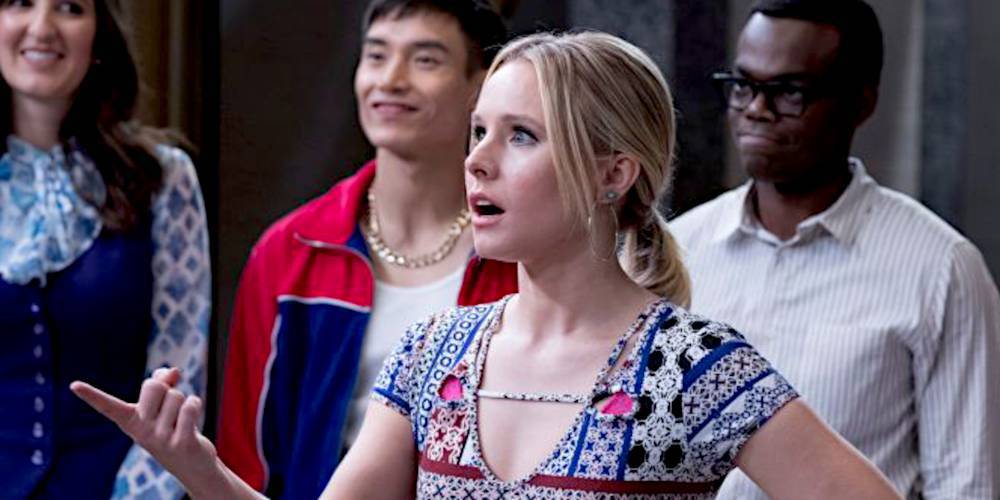The Good Place is a comedy television series created by Michael Schur, featuring the afterlife adventures of a group of people who find themselves in a secular heaven.
Their good actions on Earth assured that they belonged to The Good Place. However, they soon figure out that everything is more complicated than it looks. Eternal bliss is further than they thought!
Throughout the seasons, we follow the journeys of self-improvement taken by Eleanor, Chidi, Tahani, and Jason. They want to become better people—and along their paths, we end up learning about the various moral philosophies they encounter.
Here are some of the more profound moral philosophies that were featured in The Good Place and what they mean.
1. Metaethics
In The Good Place, one central dilemma is the question of whether it's even possible to become a better person. Well, that's where metaethics enters the show!
Metaethics is the practice of studying moral thoughts and language. In other words, metaethics not only provides us with lessons on how to become a better person, but also debates whether knowing these lessons actually makes you better or not.
In The Good Place, the characters begin studying moral philosophy because they believe that studying ethics should ultimately make them better people. But will it?
Some philosophers, like Aristotle, would say that becoming better people requires constant effort, not just knowledge.
2. Moral Intuitionism
What is moral intuitionism? It's simply the idea that we all have an inner voice that tells us whether what we do is right or wrong. You know, like a conscience. The core issue is following that voice.
The characters in The Good Place made many mistakes in life, but were they aware that what they were doing was bad?
Moral intuitionism focuses on whether we have the innate ability to "be good." It's an optimistic standpoint, positing that we don't need to study ethics or be taught the difference between right and wrong.
However, even when we know that something is wrong, we may not exactly know why it's wrong. That's where study can be useful, as knowledge can back up our inner voice when unsure of how to act.
3. Virtue Ethics
Many times what we really need is a good example to follow. Back when we were kids, before we knew the meaning of right or wrong, our behaviors were shaped by the actions of people around us.
But what makes an action good or bad? Is it the end result of the action? Or is it the intent behind the action, no matter what the end result ends up being? If you lean toward the latter, that's virtue ethics.
In virtue ethics, actions are judged by how well they conform to presupposed virtues. If courage is a virtue, then acting courageous is a good deed. If wisdom is a virtue, then seeking wisdom and acting in line with wisdom is ultimately good.
Of course, virtues aren't always set in stone—we learn what they are from the ones around us.
When in doubt about how to act, virtue ethics says we should think of someone who is virtuous and ask ourselves what that person would do in our situation. Good actions come from good character.
4. Soulmate Theory
The concept of soulmates is pretty popular in modern society and media. It's important to find "the right person for us," someone with whom we are naturally attuned, someone who loves us for who we are.
In The Good Place, everyone is awarded a soulmate upon arrival to The Good Place. Of course, in the show, that whole concept doesn't exactly work out as smoothly as we'd hope.
But where did the concept of a soulmate even come from?
One of the main sources is Plato's Symposium, in which Aristophanes tells us the story of how soulmates were made.
According to Aristophanes, we used to look quite different long ago: we had four legs, every sexual organ, and we had a great time of ourselves.
The envious god Zeus, afraid that we were too perfect, decided to end our fun by splitting us in two—male and female. From that moment on, we've been searching for our other halves. Our soulmates.
Fortunately, soulmate theory is outdated and The Good Place stresses the fact that soulmates aren't deterministic. Instead, we can build our own soulmates by investing time and energy into others.
5. The Trolley Problem
Many first-year philosophy students still have nightmares about the infamous Trolley Problem—so, of course, The Good Place has to incorporate it into the show at some point.
The Trolley Problem is a moral thought experiment:
A trolley is traveling on a track toward five people who are tied down to those tracks. They're stuck and can't escape.
You, the driver, can divert the trolley onto an alternate track—but that track, unfortunately, has a sixth person who's also tied down and can't escape.
Do you leave the trolley and let it kill five people? Or do you divert the trolley and kill one to save the five?
It's not an easy decision as there's no perfect solution. Either way, lives will be lost. But is it possible to place value on a human life? Do five lives outweigh one? Is it right to kill one to save five?
What if it wasn't just five but a hundred people tied down on the track? A thousand? A million? If you don't think it's right to divert the trolley from five, is there a number where it becomes okay?
The Trolley Problem also cleverly introduces ethical questions of active and passive behavior. If you do divert the trolley, are you morally responsible for the death of the one? If you don't divert the trolley, are you morally responsible for the death of the five?
It gives you a lot to think about, and The Good Place incorporates these kinds of thought experiments as a way to challenge us and its characters, hopefully in ways that cause us to grow.

